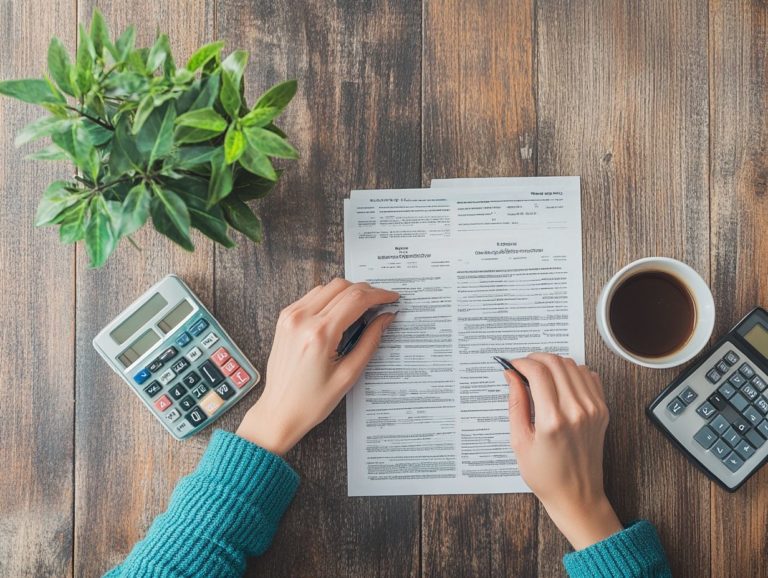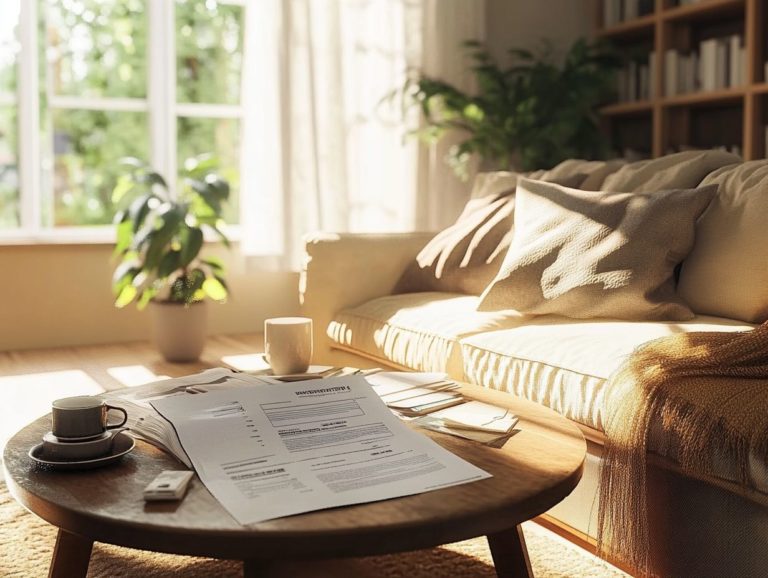How to Prepare for Homeownership
Homeownership is a dream that many aspire to achieve, providing not only financial stability but also a deep sense of personal fulfillment.
The journey to homeownership might appear overwhelming at first. This article will guide you through essential steps to prepare for homeownership, from assessing your finances and setting realistic goals to gaining a solid understanding of the homebuying process.
You’ll also discover how to find the right home and navigate the mortgage landscape, ensuring you feel confident at every step of the journey.
Prepare to transform your homeownership dreams into a tangible reality!
Contents
- Key Takeaways:
- Benefits of Homeownership
- Steps to Prepare for Homeownership
- Finding the Right Home
- Navigating the Mortgage Process
- Closing on a Home
- Frequently Asked Questions
- What are the first steps in preparing for homeownership?
- How important is it to save for a down payment?
- What should I consider when choosing a home?
- What documents are needed for the home buying process?
- What steps can I take to improve my credit score before buying a home?
- What are some common mistakes to avoid when preparing for homeownership?
Key Takeaways:

Owning a home provides financial stability and personal satisfaction. Assessing finances, understanding the homebuying process, and setting goals are crucial steps in preparing for homeownership. Additionally, preparing for a successful home inspection is vital. Identifying needs and wants, and working with a real estate agent can help find the perfect home.
Benefits of Homeownership
Homeownership presents a wealth of benefits that extend beyond mere financial gain. It offers both stability and personal fulfillment, making it a significant milestone for you and your loved ones.
Investing in property can provide long-term security in an unpredictable housing market. It gives you the opportunity to build equity and potentially enjoy the appreciation of your investment.
Owning a home also creates a sense of belonging, giving you the power to create a living space that truly reflects your unique lifestyle and values. This enriches your environment and enhances your overall life satisfaction.
Financial Stability and Personal Satisfaction
Achieving financial stability through homeownership is a compelling motivator for many. Investing in a home can profoundly enhance your personal satisfaction and quality of life.
When you own a home, you enjoy predictable housing costs, allowing for better financial planning and reducing anxiety over fluctuating rents. As you diligently make mortgage payments, you re not just paying a bill; you re gradually building equity, transforming what could be seen as an expense into a valuable investment.
Building your wealth this way boosts your financial security and opens exciting new opportunities, such as accessing credit or funding education.
You may also find tax benefits that can help ease the financial burden of homeownership. Beyond the numbers, the personal satisfaction that comes from creating a unique living space one that genuinely reflects your identity adds immeasurable value, making your house feel like so much more than just a property.
Steps to Prepare for Homeownership
Preparing for homeownership entails several vital steps that include preparing your finances for home buying, facilitating a seamless transition into buying a home.
You’ll want to start by assessing your finances, setting realistic goals, and grasping the nuances of the housing market. This preparation phase is crucial for first-time homebuyers, and learning how to stay organized during home buying will give you the power to evaluate your credit score and establish a housing budget.
By doing so, you lay the groundwork for informed decisions and increase your chances of a successful mortgage approval process.
Assessing Finances and Setting Goals
Assessing your finances and setting specific homeownership goals are essential steps in your preparation journey. These actions allow you to identify your financial responsibilities and establish a clear housing budget. Additionally, understanding how to prepare for your home inspection can further ensure a smooth buying process.
By diving into your credit score and understanding how much debt you have compared to your income, you can significantly impact your mortgage options. A strong credit score not only paves the way for lower interest rates but also boosts your chances of securing favorable loan terms.
To cultivate a sustainable housing budget, you should:
- Track your monthly expenses
- Strategically save for a larger down payment
- Explore various mortgage products that align with your financial landscape
This comprehensive approach ensures that your homeownership goals remain within reach while promoting responsible borrowing practices.
Understanding the Homebuying Process

Understanding the homebuying process is crucial for you as a prospective buyer. It equips you with the knowledge necessary to prepare for a mortgage application, sidestep common buyer mistakes, and explore the array of loan programs available.
By first securing a pre-approval, which is a process where a lender checks your credit and finances to determine how much they can lend you, you establish a clear budget. This also gives you valuable insights into the loan options that suit your financial situation.
Next, selecting a reliable real estate agent can be a game-changer. They grant you access to their expertise to find properties that align with your needs while helping you avoid potential pitfalls.
As you move toward closing, being aware of the various closing costs that may arise becomes important. These stages work together to make your journey to homeownership smoother. They empower you to make informed decisions every step of the way.
Finding the Right Home
Finding the right home is a pivotal step in your home buying journey. It demands a thoughtful evaluation of your needs, desires, and overall housing costs.
Collaborating with a qualified real estate agent adds a layer of expertise that can significantly enhance your experience. With their guidance, you can confidently navigate the complexities of the housing market.
This ensures that every decision you make aligns with both your budget and your personal preferences.
Identifying Needs and Wants
Identifying your needs and wants when buying a home is essential for making informed decisions that resonate with your housing budget and lifestyle preferences. As a discerning buyer, start by categorizing features into ‘must-haves’ and ‘desired’ amenities.
Essential aspects might encompass the number of bedrooms, proximity to schools, or a functional kitchen. Desirable elements could include a spacious backyard or energy-efficient appliances.
Utilizing tools like a home affordability calculator empowers you to realistically assess your budget, ensuring your priorities align with your financial capabilities.
Also, think about factors like location value or resale potential. These considerations can provide additional clarity on what truly matters for both your immediate satisfaction and long-term investment.
Working with a Real Estate Agent
Working with a qualified real estate agent can significantly elevate your home buying experience. They provide invaluable localized market insights and sharp negotiating skills.
These experts assist you in identifying properties that meet your specific criteria and possess extensive knowledge about neighborhoods, schools, and amenities that align with your lifestyle.
Their negotiation prowess can help you secure better prices and terms, alleviating much of the stress often associated with the process.
A skilled agent will expertly navigate the complex maze of paperwork, inspections, and closing procedures, ensuring you grasp each step along the way.
By collaborating with a real estate professional, you empower yourself to make informed decisions, ultimately paving the way to successful homeownership.
Navigating the mortgage process is a crucial part of your home-buying journey. It involves exploring a range of mortgage options, understanding the pre-approval stages, and grasping the intricacies of mortgage insurance.
Each element plays a significant role in helping you secure the financing necessary for your new home.
Types of Mortgages and How to Qualify

Understanding the types of mortgages available, like FHA and USDA loans, is key for prospective buyers. This knowledge helps you qualify for the best loan programs suited to your finances.
With options like conventional loans and VA loans, each program offers unique benefits and eligibility criteria. Evaluate your credit score, income level, and debt-to-income ratio these factors influence your loan terms.
Examine the features of each mortgage type, such as down payment requirements and interest rates. This will help you choose a loan that meets your long-term goals.
Making an informed decision can greatly impact your chances of homeownership!
Closing on a Home
Closing on a home is the final step in your home buying journey. Familiarize yourself with the closing costs and ensure a satisfactory home inspection is completed before making your earnest money deposit.
This step prepares you to confidently take ownership of your new property.
Understanding the Closing Process
Knowing the closing process is essential. It involves legal steps, various costs, and the transition into homeownership.
This journey includes signing important documents like the mortgage agreement and title transfer. You’ll handle paperwork that outlines your rights and responsibilities.
Understand the financial implications: closing costs range from 2% to 5% of your home’s price. Review these closely to prepare for this transition.
Anticipating expenses like property taxes and insurance will clarify your total ownership costs.
Finalizing the Sale and Moving In
Finalizing your home sale and moving in are exciting moments that require careful planning. Coordinate the property ownership transfer precisely and ensure all paperwork is submitted on time.
Organize your move efficiently, from scheduling movers to packing your belongings. Additionally, understanding how to prepare for a home inspection is crucial. Recognize that ongoing financial responsibilities like mortgage payments, property taxes, and maintenance are key to sustaining your new home.
By understanding these responsibilities, you ll transition smoothly into a rewarding living situation!
Frequently Asked Questions
What are the first steps in preparing for homeownership?

The first steps include assessing your finances, setting a budget, and determining your home buying goals, as well as understanding how to prepare for a home inspection.
How important is it to save for a down payment?
Saving for a down payment is crucial. It influences your loan eligibility and the interest rates offered to you.
What should I consider when choosing a home?
Consider location, size, and amenities important to you. Also, think about the cost and potential resale value.
What documents are needed for the home buying process?
Commonly required documents include proof of income, bank statements, tax returns, and identification. Your lender can provide a complete list.
What steps can I take to improve my credit score before buying a home?
To boost your credit score, pay off debts and make every payment on time. Avoid opening new credit accounts, and check your credit report regularly for errors. Dispute any inaccuracies you find.
What are some common mistakes to avoid when preparing for homeownership?
Don’t risk your dream home by skipping savings for your down payment. Consider all costs of homeownership, and for a smooth process, learn how to prepare for a home inspection as a buyer before you start your home search.






